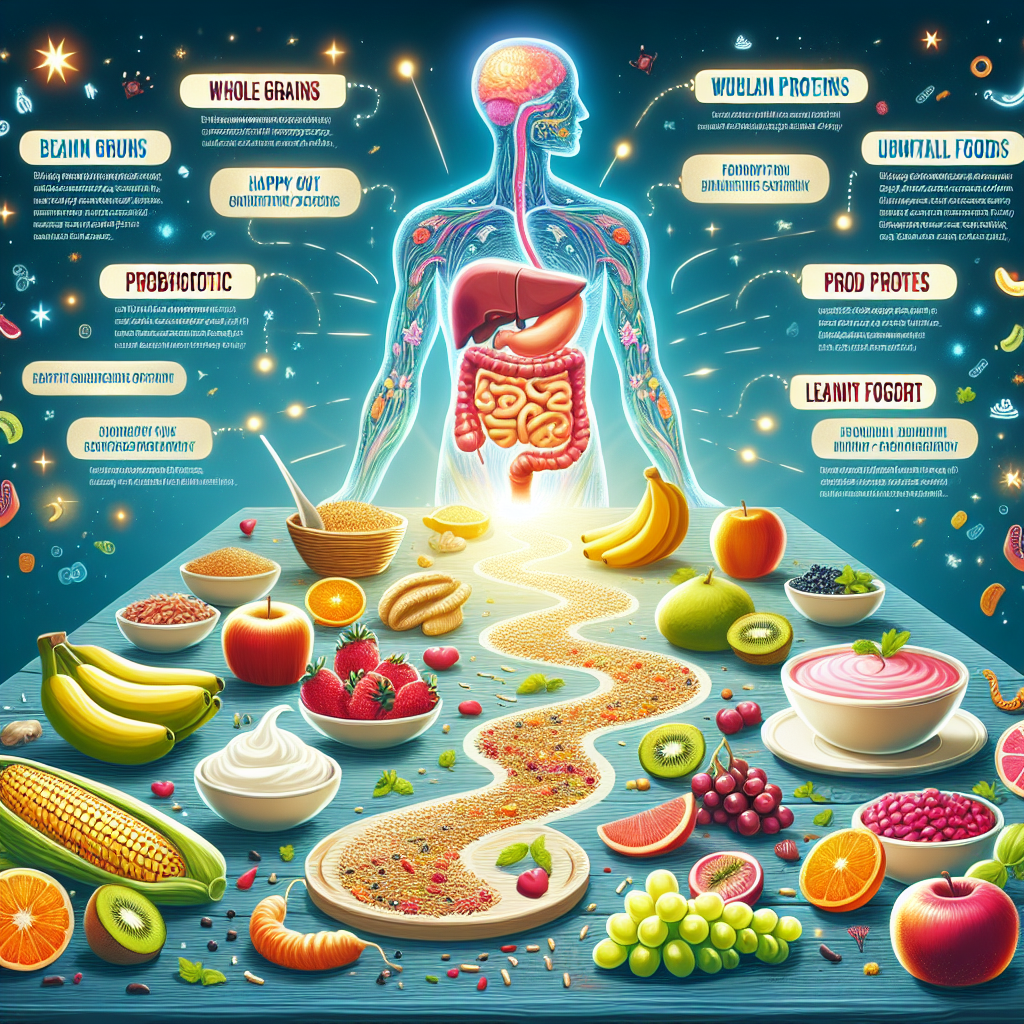The Ultimate Guide to Gut Health: Top Foods to Keep Your Digestive System Happy and Healthy

Gut health refers to the balance and optimal functioning of the gastrointestinal tract, which includes the stomach, small intestine, and large intestine. It plays a crucial role in our overall health and well-being. The gut is home to trillions of bacteria, both good and bad, that make up our gut microbiome. When the balance of these bacteria is disrupted, it can lead to various health problems.
Poor gut health has been linked to a wide range of conditions, including digestive disorders like irritable bowel syndrome (IBS), inflammatory bowel disease (IBD), and leaky gut syndrome. It can also contribute to other health issues such as allergies, autoimmune diseases, obesity, and even mental health disorders like anxiety and depression. Therefore, it is essential to prioritize our gut health in order to maintain optimal overall health.
Key Takeaways
- Gut health is important for overall health and well-being.
- The gut-brain connection means that digestive health can affect mental health.
- Eating a variety of gut-friendly foods can improve digestive health.
- Probiotics and prebiotics can help maintain a healthy gut microbiome.
- Fiber is essential for good digestive health, while processed foods should be avoided.
The Gut-Brain Connection: How Your Digestive Health Affects Your Mental Health
The gut-brain connection refers to the bidirectional communication between the gut and the brain. This connection is facilitated by the vagus nerve, which runs from the brainstem to the abdomen. The gut microbiome plays a crucial role in this connection, as it produces neurotransmitters and other chemicals that influence brain function and mood.
When the gut microbiome is imbalanced or disrupted, it can lead to mental health issues such as anxiety and depression. Research has shown that individuals with conditions like IBS often experience symptoms of anxiety and depression as well. This is because the gut produces neurotransmitters like serotonin, which is often referred to as the “happy hormone.” When there is an imbalance in the gut microbiome, it can affect serotonin production and lead to mood disorders.
Top Foods for Gut Health: A Comprehensive List of Gut-Friendly Foods
There are several foods that are beneficial for gut health. Fermented foods like yogurt, sauerkraut, and kimchi are rich in probiotics, which are beneficial bacteria that help maintain a healthy gut microbiome. These foods can help restore the balance of good bacteria in the gut and improve digestion.
Leafy greens like spinach, kale, and Swiss chard are also excellent for gut health. They are high in fiber, which helps promote regular bowel movements and prevent constipation. Fiber also acts as a prebiotic, providing nourishment for the good bacteria in the gut.
Whole grains like quinoa, brown rice, and oats are another important component of a gut-friendly diet. They are rich in fiber and other nutrients that support a healthy gut microbiome. These foods can help regulate digestion and prevent digestive disorders.
Probiotics and Prebiotics: The Key to a Healthy Gut Microbiome
| Topic | Data/Metrics |
|---|---|
| Probiotics |
|
| Prebiotics |
|
| Gut Microbiome |
|
Probiotics are live bacteria that provide health benefits when consumed in adequate amounts. They can be found in fermented foods like yogurt, kefir, and kombucha, as well as in supplement form. Probiotics help restore the balance of good bacteria in the gut and improve digestion.
Prebiotics, on the other hand, are non-digestible fibers that serve as food for the good bacteria in the gut. They can be found in foods like onions, garlic, bananas, and asparagus. Consuming prebiotic-rich foods can help nourish the beneficial bacteria in the gut and promote a healthy gut microbiome.
Incorporating probiotics and prebiotics into your diet is relatively easy. You can consume fermented foods regularly or take a probiotic supplement. Additionally, including prebiotic-rich foods in your meals can help support the growth of beneficial bacteria in your gut.
Gut-Healing Supplements: Enhancing Your Digestive Health with Nutritional Supplements
In addition to probiotics and prebiotics, there are several other supplements that can help improve gut health. Digestive enzymes, for example, can aid in the breakdown and absorption of nutrients, improving digestion. Omega-3 fatty acids, found in fish oil supplements, have anti-inflammatory properties that can help reduce inflammation in the gut.
Other supplements that can support gut health include glutamine, which helps repair the lining of the gut, and licorice root extract, which has anti-inflammatory and soothing properties. It is important to consult with a healthcare professional before starting any new supplements to ensure they are safe and appropriate for your individual needs.
The Benefits of Fiber: How Fiber Can Improve Your Digestive Health

Fiber is an essential nutrient for gut health. It is a type of carbohydrate that cannot be digested by the body, but it plays a crucial role in maintaining a healthy digestive system. There are two types of fiber: soluble fiber and insoluble fiber.
Soluble fiber absorbs water and forms a gel-like substance in the digestive tract. This helps soften the stool and promote regular bowel movements. It also helps regulate blood sugar levels and lower cholesterol levels.
Insoluble fiber adds bulk to the stool and helps prevent constipation. It also promotes regular bowel movements and helps maintain a healthy digestive system.
Some high-fiber foods include fruits, vegetables, whole grains, legumes, nuts, and seeds. Incorporating these foods into your diet can help improve digestion, prevent constipation, and support a healthy gut microbiome.
The Dangers of Processed Foods: Why You Should Avoid Processed Foods for Good Gut Health
Processed foods are often high in unhealthy fats, added sugars, and artificial ingredients. These ingredients can disrupt the balance of bacteria in the gut and lead to inflammation in the digestive tract. Additionally, processed foods are often low in fiber, which is essential for maintaining a healthy gut.
Consuming processed foods regularly can increase the risk of developing digestive disorders like IBS and IBD. It can also contribute to weight gain, obesity, and other chronic diseases like diabetes and heart disease.
To prioritize gut health, it is important to avoid processed foods and choose whole, unprocessed foods instead. This includes fresh fruits and vegetables, lean proteins, whole grains, and healthy fats. By making this dietary shift, you can support a healthy gut microbiome and improve your overall health.
The Gut-Healing Diet: A Step-by-Step Guide to a Healthy Gut Diet
Following a gut-healing diet involves making specific dietary choices that support a healthy gut microbiome. Here is a step-by-step guide to help you get started:
1. Eliminate processed foods: Remove processed foods from your diet, including sugary snacks, fast food, and packaged meals. These foods can disrupt the balance of bacteria in the gut and contribute to inflammation.
2. Increase fiber intake: Incorporate high-fiber foods into your meals, such as fruits, vegetables, whole grains, legumes, nuts, and seeds. Aim for at least 25-30 grams of fiber per day.
3. Consume fermented foods: Include fermented foods like yogurt, sauerkraut, and kimchi in your diet. These foods are rich in probiotics that support a healthy gut microbiome.
4. Choose lean proteins: Opt for lean sources of protein like chicken, fish, tofu, and legumes. These foods provide essential amino acids for gut health.
5. Include healthy fats: Incorporate sources of healthy fats into your diet, such as avocados, nuts, seeds, and olive oil. These fats help reduce inflammation in the gut.
6. Stay hydrated: Drink plenty of water throughout the day to support digestion and prevent constipation.
By following these guidelines and making conscious choices about what you eat, you can support a healthy gut microbiome and improve your digestive health.
Lifestyle Changes for Better Digestive Health: Simple Changes You Can Make for a Healthier Gut
In addition to dietary changes, there are several lifestyle changes that can improve gut health:
1. Reduce stress: Chronic stress can disrupt the balance of bacteria in the gut and contribute to digestive issues. Practice stress-reducing techniques like meditation, deep breathing exercises, and regular physical activity.
2. Get enough sleep: Lack of sleep can negatively impact gut health. Aim for 7-9 hours of quality sleep each night to support optimal digestion.
3. Exercise regularly: Regular physical activity can help improve digestion and promote a healthy gut microbiome. Aim for at least 30 minutes of moderate-intensity exercise most days of the week.
4. Avoid smoking and excessive alcohol consumption: Both smoking and excessive alcohol consumption can disrupt the balance of bacteria in the gut and contribute to digestive issues. Quit smoking and limit alcohol intake to support a healthy gut.
5. Stay hydrated: Drinking enough water throughout the day is essential for maintaining optimal digestion and preventing constipation.
By making these lifestyle changes, you can support a healthy gut microbiome and improve your digestive health.
Gut Health and Disease Prevention: How Good Digestive Health Can Help You Avoid Chronic Diseases
Maintaining good gut health is not only important for digestive health but also for overall health and disease prevention. Research has shown that a healthy gut microbiome can help prevent chronic diseases like diabetes, heart disease, and certain types of cancer.
A healthy gut microbiome helps regulate blood sugar levels, cholesterol levels, and inflammation in the body. It also plays a crucial role in nutrient absorption and immune function. When the gut microbiome is imbalanced or disrupted, it can contribute to the development of chronic diseases.
By prioritizing your gut health through diet, lifestyle changes, and supplementation if necessary, you can support a healthy gut microbiome and reduce your risk of developing chronic diseases.
In conclusion, gut health is crucial for overall health and well-being. Poor gut health can lead to various health problems, including digestive disorders, mental health issues, and chronic diseases. By prioritizing gut health through diet and lifestyle changes, you can support a healthy gut microbiome and improve your digestive health. Incorporating gut-friendly foods, probiotics, prebiotics, and supplements can all contribute to a healthy gut. Additionally, making lifestyle changes like reducing stress, getting enough sleep, and exercising regularly can further support gut health. By taking care of your gut, you are taking care of your overall health.
FAQs
What is gut health?
Gut health refers to the balance of microorganisms that live in the digestive tract. A healthy gut contains a diverse range of beneficial bacteria that help with digestion, immune function, and overall health.
What are the best foods for gut health?
Foods that are high in fiber, prebiotics, and probiotics are great for gut health. Examples include fruits, vegetables, whole grains, legumes, yogurt, kefir, sauerkraut, and kimchi.
What are prebiotics?
Prebiotics are a type of fiber that feed the beneficial bacteria in the gut. They are found in foods such as onions, garlic, bananas, asparagus, and whole grains.
What are probiotics?
Probiotics are live bacteria and yeasts that are good for your health, especially your digestive system. They are found in fermented foods such as yogurt, kefir, sauerkraut, and kimchi.
How do probiotics help gut health?
Probiotics help to maintain a healthy balance of bacteria in the gut, which can improve digestion, boost the immune system, and reduce inflammation.
Can supplements be used for gut health?
Yes, probiotic supplements can be used to improve gut health. However, it is important to choose a high-quality supplement that contains a variety of beneficial bacteria strains.
What are the benefits of a healthy gut?
A healthy gut can improve digestion, boost the immune system, reduce inflammation, and even improve mental health. It may also reduce the risk of certain diseases such as obesity, diabetes, and heart disease.